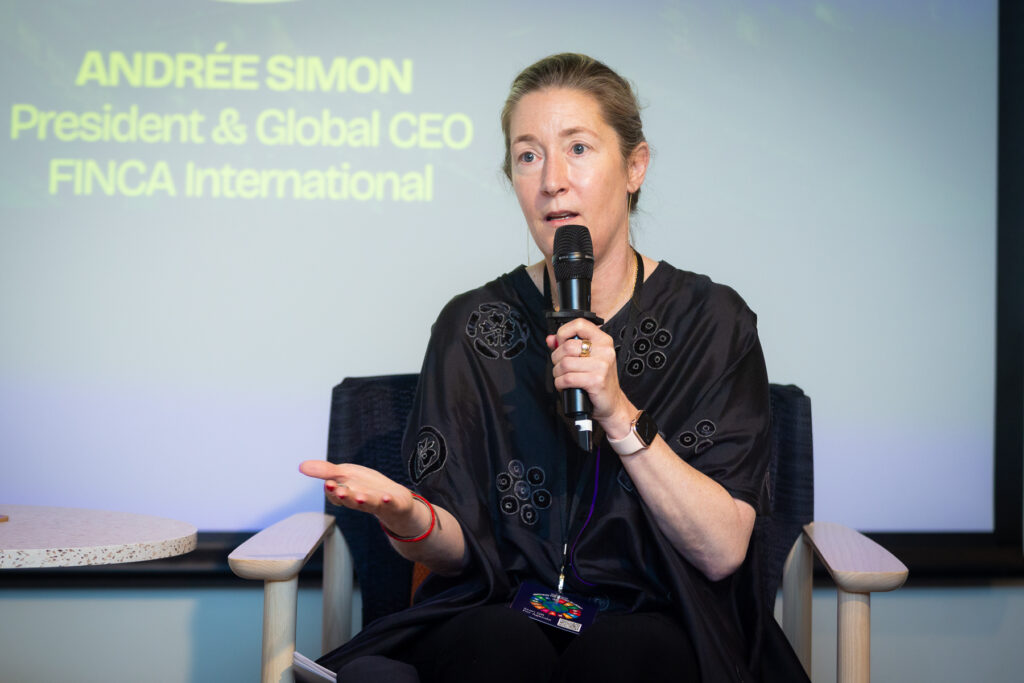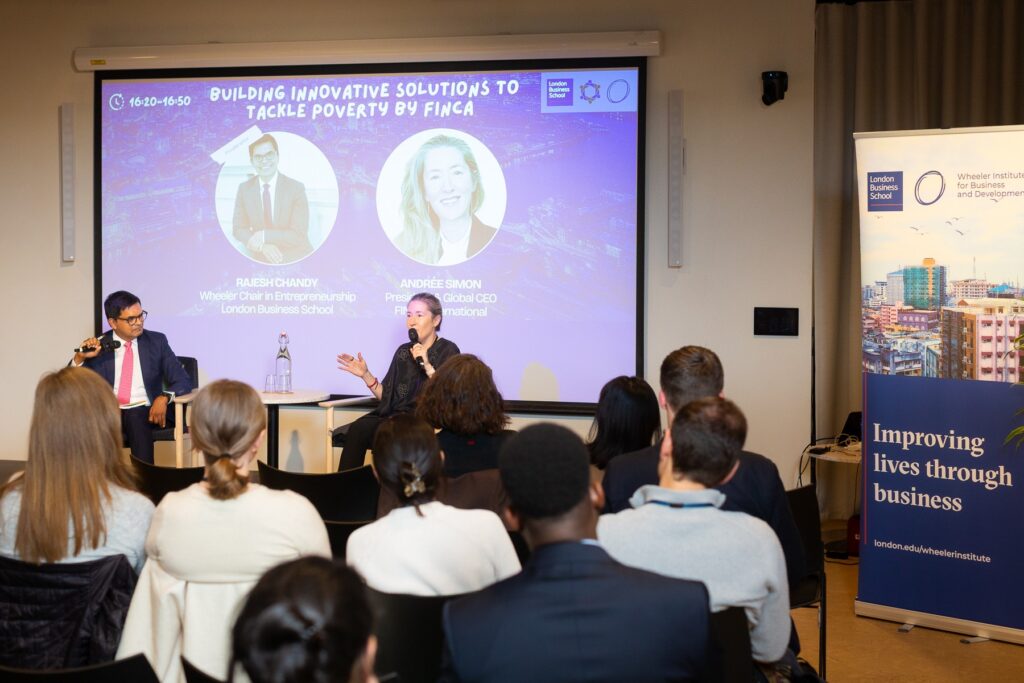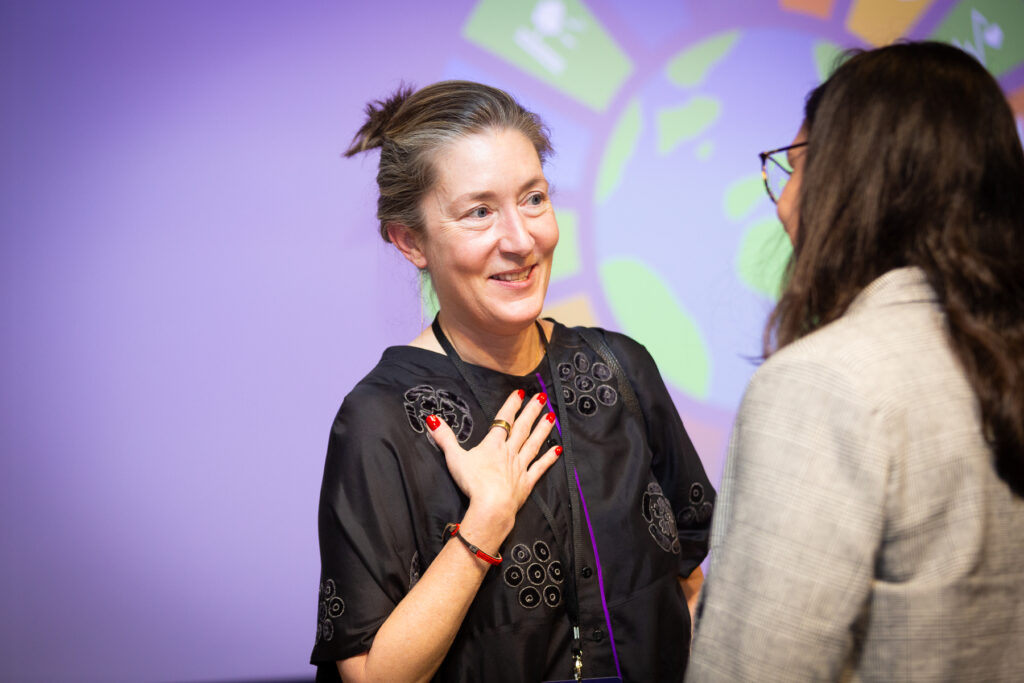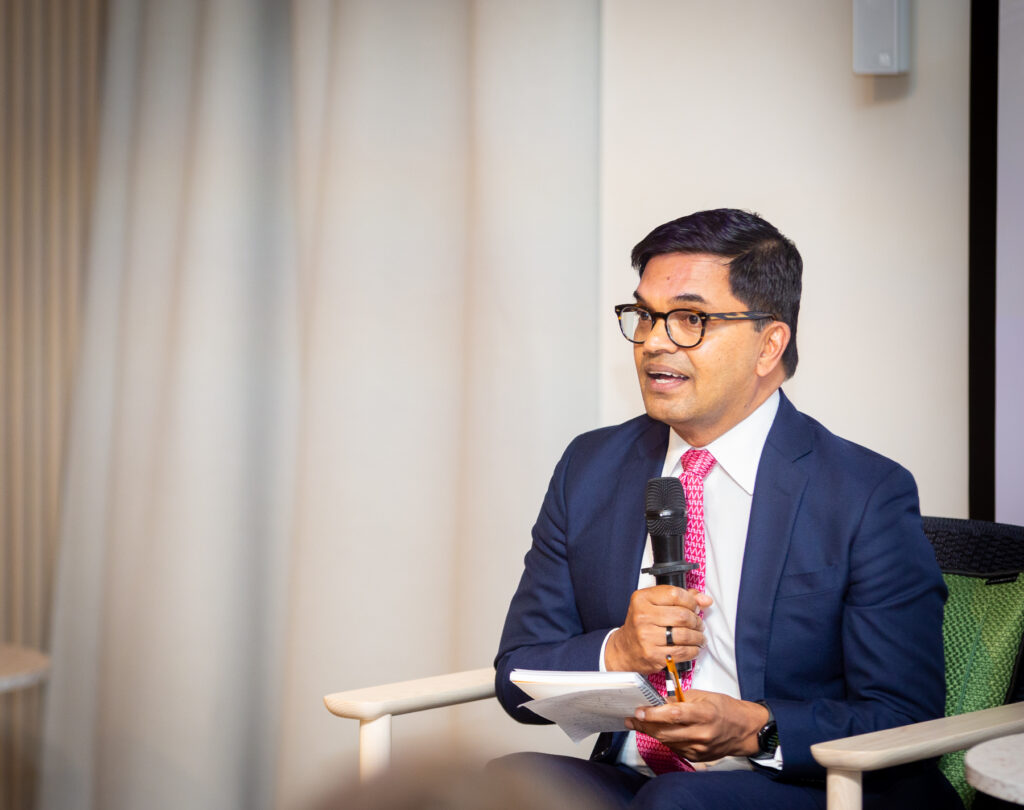In a compelling fireside chat at the 2025 Social Impact Conference, hosted by the Social Impact Club of London Business School in collaboration with the Wheeler Institute for Business and Development, Andrée Simon, Global CEO of FINCA shared her vision for transforming global capital flows to better serve those most in need. Moderated by Rajesh Chandy, Tony and Maureen Wheeler Chair in Entrepreneurship and Co-Academic Director of the Wheeler Institute, the session explored the intersection of innovation, equity, and financial inclusion.


Challenging traditional development paradigms
Simon opened with a powerful assertion: poverty is not a result of lack of ability. Instead, it is the result of systemic inefficiencies that deny opportunities and resources to individuals who are willing and able to work hard. Since its founding in 1984, FINCA has sought to bridge this gap by deploying capital to underserved communities, aiming to unlock human potential through financial empowerment. A cornerstone of global inclusive finance, FINCA and its partners now work in more than 45 countries and impact the lives of more than 9 million people each year.
Highlighting a poignant example, Simon described a Zambian woman who financed her small enterprise with a loan carrying a 100% interest rate. Despite the steep terms, this capital enabled her to begin building rental properties, an essential income stream she needed to support her retirement. It illustrates both the desperate need for better financial services and the transformative impact of entrepreneurship when even modest resources are made available.


Rethinking capital and development
Simon, a Wharton MBA, emphasised that global capital allocation remains woefully inefficient, often bypassing those who could use it most productively. In Zambia, FINCA itself faces a 28% cost of funds, a stark indication of the challenges in making finance accessible and affordable.
She argued for a model of development that places agency in the hands of local communities, moving beyond the outdated saviour complex often still present in development aid. “We ask people what they need most,” Simon said. “We work with them to generate stable income, withstand external shocks, and help educate their children.” In an era of shrinking external development assistance, she called for a pause and reassessment: what investments will truly move the needle for the communities being served?
Technology as an imperative, not just an opportunity
While the role of technology in expanding financial inclusion is often celebrated, Simon was candid about its limitations. In places like the Democratic Republic of the Congo, mobile payment platforms like FINCA’s Click remain underutilised due to low phone penetration and literacy rates. FINCA is bridging this gap through low-cost solutions like automated voice feedback systems and AI-supported credit assessments, ensuring that digital innovation serves real-world needs rather than excluding the most vulnerable.
Leadership, legacy, and the human element
Reflecting on her own journey, Simon underscored the importance of relationships and purpose. With a background in economics and liberal arts, she spoke of the mentors who shaped her path and the colleagues who have walked alongside her for decades. “Follow your heart,” she advised the audience, “and be where you can add value.”
Her interaction with young entrepreneurs launching microfinance ventures in Africa was both encouraging and challenging. While acknowledging that the field is far from saturated, she urged newcomers to clearly define their competitive edge. With two billion people globally self-employed out of necessity, the space for innovation remains vast.
Building ecosystems and funding resilience
FINCA is not only a lender but an investor. Its investment arm, FINCA Ventures, supports early-stage enterprises that are solving core challenges faced by communities across Sub-Saharan Africa. Notably, the firm is exploring pre-seed investments to fill the funding gap before Series A, a critical juncture where many promising ideas falter.
Simon highlighted the need for collaboration among impact investors. The historic scarcity mindset and competitive behaviour among development actors have hampered scale and sustainability. Instead, she advocated for focused dialogue between investors and operators, aligned on systemic impact over fragmented efforts.
A call to action
As global development funding contracts and the world faces persistent poverty, migration, and climate challenges, Simon’s message was clear: bold, inclusive, and community-rooted approaches are essential. With visionary leadership and targeted capital, organisations like FINCA can continue to unlock the potential of people too often overlooked by traditional financial systems.
Responsible AI to support social impact
The Wheeler Institute was delighted to partner with FINCA and host a roundtable focused on the transformative potential of responsible AI in driving social impact. The gathering brought together an impressive group of participants, including academics, business practitioners, and industry experts, to explore the societal implications and ethical dimensions of AI. The report is available to download here.
About the speakers

Andrée Simon is Global CEO of FINCA International. Andrée oversees FINCA’s work toward one mission: ending poverty through sustainable and scalable solutions driven by the insights and needs of people in the communities where they live and work. Andrée and her leadership team create opportunity for over six million people in more than 40 countries. FINCA takes a holistic approach to this mission, focusing its investments in solutions that generate measurable results in income generation, resilience, and access to education.
Andrée has significant experience in corporate strategy and has held business and advisory roles in many organizations, including the Center for Strategic and International Studies. Andrée is fluent in French and Spanish. She earned an undergraduate degree in international relations from the University of Virginia, an M.A. from The Johns Hopkins University School of Advanced International Studies, and an M.B.A. in finance from the University of Pennsylvania’s Wharton School.

Rajesh Chandy is Professor of Marketing and the Tony and Maureen Wheeler Chair in Entrepreneurship at London Business School, where he is also the Academic Director of the Wheeler Institute for Business and Development. Rajesh’s current research lies at the intersection of business and development. His recent projects have covered the impact of business skills among micro-entrepreneurs in South Africa, novel financing approaches in Ghana, property rights in slums in Egypt, innovation among farmers in India, highways and private education expenditures in India, and using big data for development outcomes.
Rajesh is a member of the advisory board of the Journal of Marketing and a Co-Editor of the journal’s special issue on “Better Marketing for a Better World”. He is also co-editor of the Management Science special issue on “Business and Climate Change,” and previously served as an Area Editor for the Entrepreneurship and Innovation area at Management Science. His research and publications have received several awards, including the Mahajan Award for Lifetime Contributions to Marketing Strategy Research.
About the author

Max Thomas is an MBA 2025 candidate at London Business School and an Outreach and Communications Intern at the Wheeler Institute for Business and Development. Prior to joining London Business School, he worked at McKinsey & Company as an associate in Brussels. Max is passionate about business as a force for good, and the impact education and healthcare systems have on human development.
